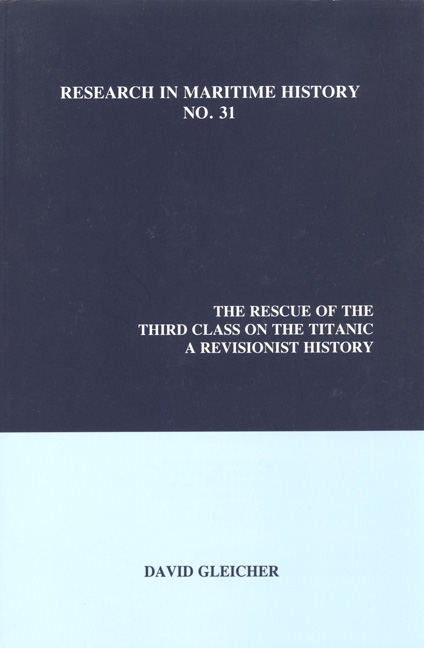Book contents
- Frontmatter
- Dedication
- Table of Contents
- List of Tables in the Text
- List of Illustrations
- Preface
- Notes on the Text
- Introduction
- Chapter 1 The “Popular Story”
- Chapter 2 The Nature Theatre of Oklahoma
- Chapter 3 Except the Rules
- Chapter 4 Departures
- Chapter 5 Like Wild Beasts Ready to Spring
- Chapter 6 Loose Ends
- Chapter 7 A Statistical Study
- Chapter 8 In Conclusion
- Appendix 1 Groupings of Nationalities into Regions
- Appendix 2 Routes to the Lifeboats
- Appendix 3 Deck Plans
- Bibliography
Chapter 3 - Except the Rules
- Frontmatter
- Dedication
- Table of Contents
- List of Tables in the Text
- List of Illustrations
- Preface
- Notes on the Text
- Introduction
- Chapter 1 The “Popular Story”
- Chapter 2 The Nature Theatre of Oklahoma
- Chapter 3 Except the Rules
- Chapter 4 Departures
- Chapter 5 Like Wild Beasts Ready to Spring
- Chapter 6 Loose Ends
- Chapter 7 A Statistical Study
- Chapter 8 In Conclusion
- Appendix 1 Groupings of Nationalities into Regions
- Appendix 2 Routes to the Lifeboats
- Appendix 3 Deck Plans
- Bibliography
Summary
Expressions of Power
The half hour between 12:30 and 1 AM was pivotal the rescue of Third Class passengers on Titanic. It was marked by a confluence of three heretofore separate elements of the rescue. By 12:30 to 12:45 AM, 200-300 Third Class men from the forward end had arrived in the stern. Second, by 12:30 preparations were underway on the after Boat Deck and A Deck to load and launch the eight lifeboats from the after end; Lifeboats 9 and 10 were the first to depart, at 1 AM (see table 6). The third element was a change in Smith's view and that of the senior officers as to the nature of the rescue. Over this half hour it was becoming clear that contact would not be made with Califomian. By the same token, due to the unusually calm water the lifeboats would remain intact long enough for the next-nearest ship, Carpathia, to rescue the occupants.
A question posed in almost all the popular accounts is whether, and to what degree, Third Class passengers were prevented by the authorities from reaching the after Boat Deck and A Deck when these lifeboats were launched. That few Third Class passengers reached the boats is indisputable. But when it comes to the issue of the authorities’ intentions, the evidence generally adduced has been to the two confrontation set pieces discussed in chapter 1, the Buckley and Farrell incidents. The power of the authorities, it is implied, was telling only when it burst through civil discourse; that is, when it was expressed in violence or the immediate threat of violence. Something of an exception to this conventional view have been cursory suggestions by Brown and Davie that the authorities, in the personage of Captain Smith, intentionally misled passengers into thinking the ship was not going to go down before they were rescued.
Just which routes remained closed and which were opened will never be known with certainty. It is indisputably true, however, that the majority of third-class passengers were unable to get to the boat deck until nearly all of the lifeboats had been launched… This appears to be another consequence of the general lack of knowledge about the ship's condition among all passengers. That ignorance was the result of Captain Smith's deliberate [author's emphasis] plan to not issue a general ‘abandon ship’ order.
- Type
- Chapter
- Information
- The Rescue of the Third Class on the TitanicA Revisionist History, pp. 79 - 104Publisher: Liverpool University PressPrint publication year: 2006



